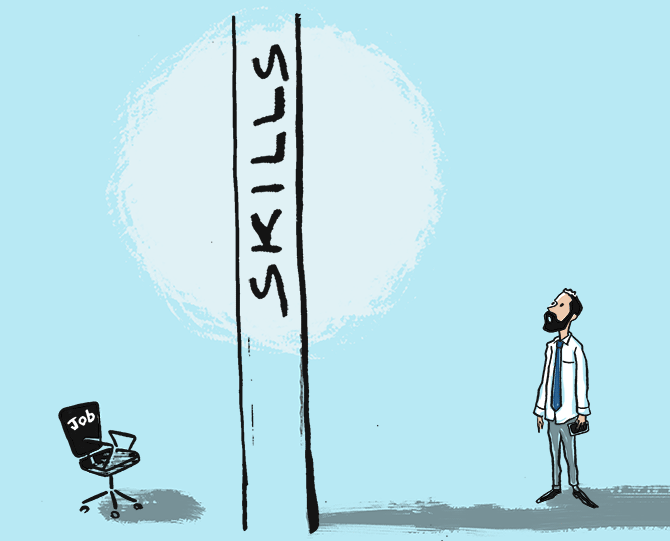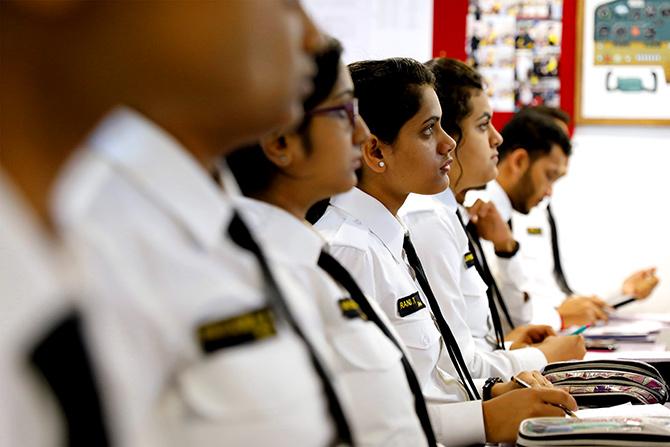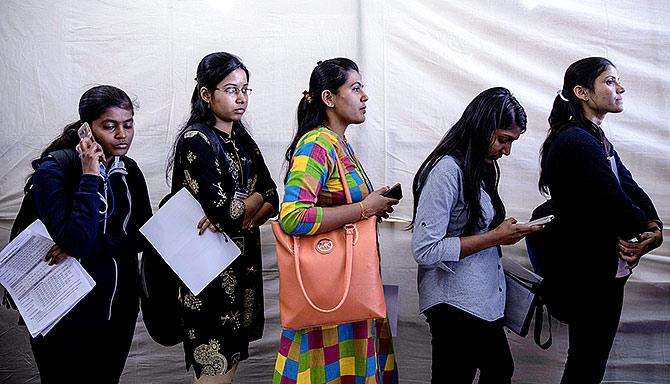'50% of students lose out because of lack of English language skills.'
'Only 15% to 20% have the functional skills companies are looking for.'

When career assessment and research solutions firm Aspiring Minds first published its National Employability Report in 2010, it was shocking to learn that 82% IT engineers in India were found unfit for any job.
Nearly a decade later, the National Employability Report 2019 is no different.
It says '80 per cent Indian engineers are not fit for any job in the knowledge economy.'
The findings -- based on data collected from 170,000 students from across 750 plus colleges in India -- states that only a handful of Indian engineers possess coding expertise.

Stressing on the lack of industry relevant curriculum and exposure, the NER reported how students were 'trapped in a college bubble.'
'Sixty percent of faculty do not discuss how engineering concepts apply to industry,' the report said.
"When you have such wide unemployability, it is the system which has failed the students," Varun Aggarwal, co-founder and CTO, Aspiring Minds, left, tells Divya Nair/Rediff.com.
Indian graduates continue to face a skills gap and are unfit for employment, according to the latest Aspiring Minds report. What reasons do you attribute for this?
There is really no macro change in India's higher education policy in the last decade, or even more.
Any policy needs to encourage that the higher education sector works like a market -- universities and institutions are run by professional management, educated individuals and global corporations are incentivised and excited to get into the sector, there is healthy competition which leads to improvement in quality of education.
The government needs to play a role in making this market efficient by creating transparent information about the quality of institutions, so that the parents and students choose colleges based on real factors rather than marble flooring, chandeliers and foreign faces.
Rating of colleges need to be based on outcomes, such as performance of faculty/students in standardised tests, employer rating, than input parameters like number of labs, faculty, area, etc.
Ranking of colleges on these parameters should be widely made available, which helps parents/students make the right choices and creates incentives for colleges to improve on these parameters.
In the last decade, lot of efforts have been made, which have created some centres of excellence.
However, this has really made no sizable difference in aggregate.
The government needs to take higher education as a priority and understand that it has a direct short term and long term impact on economic growth.

Kindly note: All images only published for representational purposes. Photograph: Brian Synder/Reuters
In your opinion, where are students going wrong? What can they do to reverse the trend?
Honestly, it is not the students's mistake. When you have such wide unemployability, it is the system which has failed the students and not otherwise.
My suggestion to students is that they really concentrate on learning and not study for the exams.
Most exams in Indian universities are rote-learning based and really do not test concepts or application. This puts the onus of finding the right direction and learning, squarely on the students.
Free online courses from the best universities in the world come to the rescue. Students should actively use these resources to further their learning and also testing themselves.
They should involve themselves into doing projects, where they build things from scratch.
In engineering, you learn by doing. Doing proper internships is another great way to learn.
Also, there is a big belief among students that what they are learning in the curriculum is not relevant or used at work. There is nothing more untrue than that.
The basic concepts of engineering have broadly not changed in the last three decades, even though there are some tweaks to it.
Knowing the curriculum well, and understanding the concepts is key for success.
My general suggestion to students is that they should just plan to put in 7 to 8 productive hours every day, in whatever interests them.
By productive hours, I mean hours spent in learning or creating something that interests them.
This will still leave them enough time for movies, gossip, and what not. But, if they can spend those 7 to 8 hours in learning or creating something, it will automatically solve all problems.

How can graduates be job-ready at the end of college?
There is a simple framework for this.
The industry looks for four kinds of skills: Language, cognitive skills (aptitude/problem solving), functional skills (programming/circuit design) and soft skills.
NER-2019 reveals that there is a gap in pretty much all these skills.
For instance, 50% of students lose out because of lack of English language skills, while only 15% to 20% have the functional skills the companies are looking for.
Functional skills are very much part of the college curriculum, but as I said that college exams and most of the times, teaching is rote learning based.
Thus, students do not understand concepts and are unable to apply them.
For example, only 5% engineers from IT and IT-related branches can write a 15 line program to solve a given task.
Again, there is enough evidence, that application-based learning, projects, etc improve cognitive and problem solving skills.
Such learning should start in the early years. Science says there is scope for huge improvement in these skills right after adolescence.
Language is developed both during school and later.
Colleges should provide programmes to improve language skills, also, because all engineering curriculum and material in India is in English.
When the student enters college, there should be tests to find a student's gap in language and cognitive skills and bridge programmes should be offered in the first year.
For soft skills, companies are mostly just looking for a learning attitude and basic work discipline. They are happy to train candidates further.
One area, where the gap will amplify in the days to come, is new age skills.
Skills in areas of AI, mobile, product management, data engineering, etc are going to be in big demand.
These are neither covered in curriculum nor do we have trained faculty in these areas.
In fact, India has never been a participant in new age technologies -- be it the Internet, mobile, and now AI.
Are communication and English grammar skills really important to succeed in a career?
For the right or wrong reasons, it is.
The Indian knowledge economy's operative language is English.
This is unlike China, where the industry uses Mandarin.
For most jobs, good English and communication skills are required and better skills lead to higher wages.
Of course, there are exceptional candidates, who can make a career for themselves despite poor English skills, if they are great in other things. But, on average, English is important and will continue to be so.
Not everyone is lucky enough to make it to a good college/institution or have access to good faculty. How can they still make the most of their education?
According to our report, 70% employable engineers for IT roles come from the so-called tier 2 colleges.
I have talked to many students and hired some, who come from lesser-known colleges but are just excellent.
Yes, college does make a difference.
However, if students are ready to work hard, if they are motivated to succeed, all content, video lectures, and even student communities are available online.
Students need to make use of variety of MOOCs (Massive Open Online Courses) online.
Further, they can get project ideas from open-source projects, learn and contribute to open-source communities, take up freelance projects/work.
The opportunities and avenues to learn are unlimited -- students need to be motivated and ready to put in the hours.
Do you think students in India pick engineering out of peer or parental pressure?
Yes, there continues to be pressure to pursue engineering.
But I see that changing quite rapidly, with at least kids from the middle class being more experimental and going into areas such as psychology, design, architecture and others.
At the same time, one needs to understand, that engineering still remains the only undergraduate degree which offers a good salary and decent work, at a large scale of graduating class.
IT jobs are still the biggest share of jobs in the knowledge economy for a fresher as they graduate.
Do you think counselling can help?
Counselling definitely is needed at every stage to make students aware about the opportunities and challenges.
For instance, if you look at arts, till a decade back there weren't a lot of jobs for this skill in the knowledge economy.
But today UI/UX designer is big which requires creative skills, design skills and computer skills. Students and parents need to know about these opportunities.
Similarly, our report finds that a large proportion of students (38.6%) are confused about which companies and profiles they should apply for. This clearly shows the need for counseling.
Have you been working on solutions too?
AMCAT (Aspiring Minds' Computer Adaptive Test) creates a big impact on students and colleges.
Students can take this test to get feedback on their skills, tips on how to improve and pointers to free learning resources.
Our data shows that 71% of students change their study schedule based on AMCAT reports and 72% students use resources mentioned in the AMCAT report.
Further, we work closely with colleges.
Many of them now take our help in testing students on employability skills in every year.
We provide them student level and branch-level feedback on areas of improvement for students and what the students may do the bridge the gap.
Our data shows that colleges can substantially improve student employability by doing multi-year testing and interventions.
Some colleges have recently started working with us in helping test faculty and improve them.
We also do the National Employability Conclaves in multiple cities every year, where we discuss various improvement strategies with college administration.
More recently, we have launched products which help students build their resume and prepare for interviews.
Here we use AI to do automated interviews and evaluation of interviews. It is a good example of how AI can develop skills at scale.

What are some of the most interesting careers that youngsters are not aware of that you think they should pursue?
As the wave of automation has taken over all the major industries, new-age skills like Artificial Intelligence, machine learning, data science, data engineering and mobile development are in great demand.
Apart from these, there are roles of growth hackers, product managers, UI/UX designers, content marketers, SEM and SEO specialists etc. which are in great demand and very interesting.
In your opinion, have any of the programmes/initiatives by the recent governments helped change the situation for good?
No government has really taken up higher education on priority as they would take ease of doing business, or a social redistribution scheme.
Rather than piecemeal interventions, there is need of uphaul of higher education policy, continuous changes, which will take 5 to 10 years to show impact.
What are some of the best educational initiatives you have come across in recent times?
The Dell Foundation has run programmes with Haryana schools, where they constantly measure learning outcomes, do different interventions and scale interventions which show impact.
Similarly, there has been work done in Delhi government schools. Another example is Teach for India.
If we could frame a similar programme say, Teach for Engineering, where company personnel come and teach a semester at a college, given, the applied nature of engineering, this can lead to wonders.
In the NER 2019 survey, over 60% respondents said they wanted to work for a big company, as against 8% who want to work with start-ups. Do you think this is this a healthy statistic?
>Large companies offer security and opportunities of a stable work life.
On the other hand, start-ups are more fast-paced, flexible, diverse and risky as workplaces.
Generally, people get more responsibility and more things to learn in a start-up.
At one end, it is a major of choice for youngsters. But, definitely for innovation and long term growth, it will be great to see more youngsters joining and starting companies.
How can India produce more entrepreneurs who will train and hire freshers?
Economic theory says that skilled people become entrepreneurs if there aren't enough jobs for them.
For example, if there is a person who is great at coding, but cannot find a job, s/he can get together with her/his friends with complementary skills and start a company.
Thus, if we want more entrepreneurs, we need to make a much larger proportion of our students employable and provide them with skills.
No skills means no critical mass to become entrepreneurs.
Further, colleges could take initiatives to expose students to entrepreneurship. This can be done through talks by entrepreneurs, business plan competitions, encouraging entrepreneurial projects and so on.
Different stakeholders at national, state, university and institutional level could make seed funding available which is given competitively.
An interesting idea could be to give students to do an entrepreneurial venture in their final semester, which will give them six months of risk-free time to try out something.
Also, helping students with some business skills in sales, accounting and marketing is helpful. This could be done through mentorship programmes or otherwise.
Your message for students, parents and teachers.
I would say three things.
First, the world is changing very fast and new opportunities, careers, fields and concepts are coming up every day.
We all need to keep our eyes and ears open, explore and find what's interesting.
There are so many economic opportunities today for people who chase their passion.
Second, as clichéd it may sound, work hard.
If one puts 7 to 10 hours of productive work every day consistently, it will lead to results.
Last, while we keep ourselves informed, never let go of basic concepts and first principles. They will never change.
And if you know them well, you could learn anything new that shall come up too.










